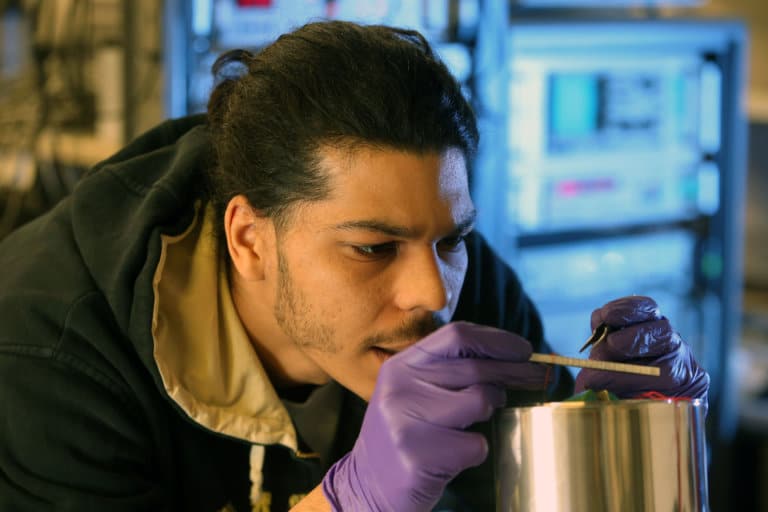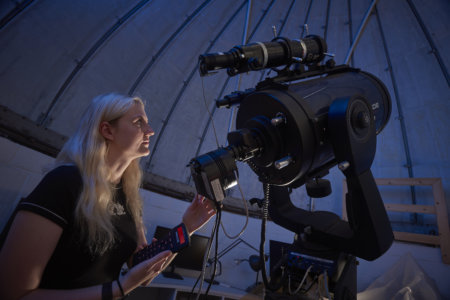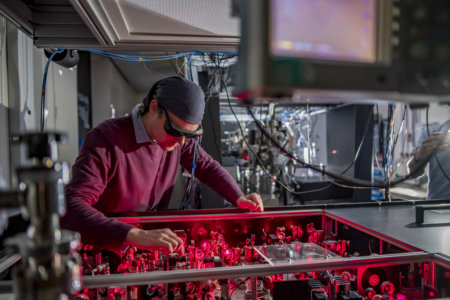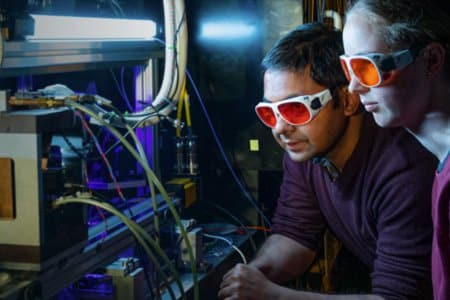
Physics and astronomy are two closely linked subjects. The study of both develop a deep understanding of the relationship between the universe’s physical laws and how it applies through different scales of space and time. For example, the forces of gravitation, cosmology and planetary geology are all elements that physicists and astronomers continuously learn about and make new discoveries.
Beyond a fascinating exploration of the fundamental principles of the universe, these subjects equip students with extraordinary skills and knowledge. These include advanced numeracy, analysis of complex data, reasoning, analytical thinking, problem-solving, and more.
Understanding the smallest particles to the vastness of space is a pursuit that sets many up for diverse careers. Graduates can seek many roles, apart from just physicist, astronomer or astrophysicist. They can work in industries like aerospace, engineering, data science, finance, and technology. It’s a highly rewarding future, one where there’s constant pushing of the boundaries of human knowledge and technological progress.
Such outcomes can be found at universities offering fulfilling and enriching education and research in these fields, like the three listed below:
Cardiff University
Studying at Cardiff University School of Physics and Astronomy brings you closer to the forefront of research and innovation. Ranked second in the UK for research impact and located in the capital city of Wales, Cardiff is a Russell Group institution in the top 25 universities in the UK. Exciting scientific discoveries are made here, as are inspired students and staff.
Cardiff University Physics offers six, research-led master’s programmes: Physics, Astrophysics, Data Intensive Physics, Data Intensive Astrophysics, Compound Semiconductor Physics, and Gravitational Wave Physics. Each includes a project designed to mirror research groups, with support from academic staff and postgrad researchers. With access to an outstanding array of facilities, you will learn in a friendly, collaborative environment.
All programmes cover theoretical, observational, and experimental techniques across a wide variety of areas and combine data analysis and computational techniques with the core science disciplines. These include fundamental physics (theoretical and experimental) and range from the physics of nanoscale devices to the cosmos, on scales from planets to the whole universe. You will be taught by members of internationally-leading research groups including the Institute for Compound Semiconductors; the Gravity Exploration Institute, one of the largest gravitational wave research groups in the world; and the Cardiff Hub for Astrophysics Research and Technology, one of the largest groups of astronomers in the UK.
Each programme is designed to equip you with the skills and knowledge needed for a range of careers from academic research to technical, development and engineering roles in related scientific fields. All programmes welcome applications from a broad range of backgrounds, including engineering, computer science or maths, provided you have sufficient experience with core concepts such as maths and coding.

Source: Facebook, Imperial College London
Imperial College London
To change the world, start at a university with science at its heart. Imperial College London ranks among the world’s top 10, tops league tables in the UK for graduate employability and is the University of the Year (The Times/Sunday Times Good University Guide 2022). It stands out among other UK universities for its specialist focus on science, engineering, medicine and business.
Within Imperial’s Faculty of Natural Sciences, an inspiring community of scholars is tackling some of our time’s most significant scientific challenges. They are striving to deploy cutting-edge science for the broader benefit of society. Leveraging its world-renowned expertise in physics, chemistry and life sciences, the faculty has won 1.5 million pounds from the UK’s Engineering and Physical Sciences Research Council (EPSRC) to harness the power of supercomputers for a greener society. The faculty has also conducted studies on the benefits of COVID-19 vaccines for healthy teenagers and is actively studying the sources, impact and solutions to plastic in the ocean, among many other ground-breaking projects.
Established professors place a strong emphasis on interdisciplinary excellence. Across its expansive range of undergraduate and postgraduate degree programmes to choose from — which span the core scientific disciplines of Chemistry, Mathematics, Physics and Life Sciences — the faculty’s goal remains the same: to educate scientists of the future; make fundamental discoveries in the physical, mathematical, and life sciences; integrate research across these areas in a multidisciplinary manner; and to use these discoveries for the benefit of all.
As an Imperial student, you will benefit from being part of a leading research community with access to teachers and facilities at the forefront of their field.

Source: Facebook, University of Manchester
University of Manchester
Home to outstanding research, leading facilities and internationally-renowned physicists and astronomers, the University of Manchester’s Department of Physics and Astronomy prepares future leaders in academia and industry. The department explores and addresses fundamental questions from the tiniest particles to the grand cosmos and everything in between.
The hands-on nature of a Manchester education means students learn through lectures, interactive sessions, tutorial classes, laboratory work and workshops. The department offers a comprehensive continuum of doctorate, master’s, and bachelor’s programmes.
If you are interested in classical physics, including dynamics, waves, electromagnetism and thermodynamics, then the MPhys Physics degree fits the bill. Course modules dive deeper into concepts such as the unification of space and time, the meaning of wave-particle duality and the relation between entropy and disorder.
Students have access to various facilities that rival those of leading departments worldwide. They include the new 10 million pounds extension to its Schuster Laboratory and the world-famous Jodrell Bank Observatory.
Here, students develop their expertise in topics such as atomic and molecular structure; solid state electronic devices; electromagnetic radiation; lasers, stars, and cosmology; particle and nuclear physics; and the more advanced aspects of theoretical physics. Graduates from this programme obtain scientific, technical, and computing jobs or go on to pursue doctoral research, while many enter the commercial, financial and business sectors too.
*Some of the institutions featured in this article are commercial partners of Study International P










